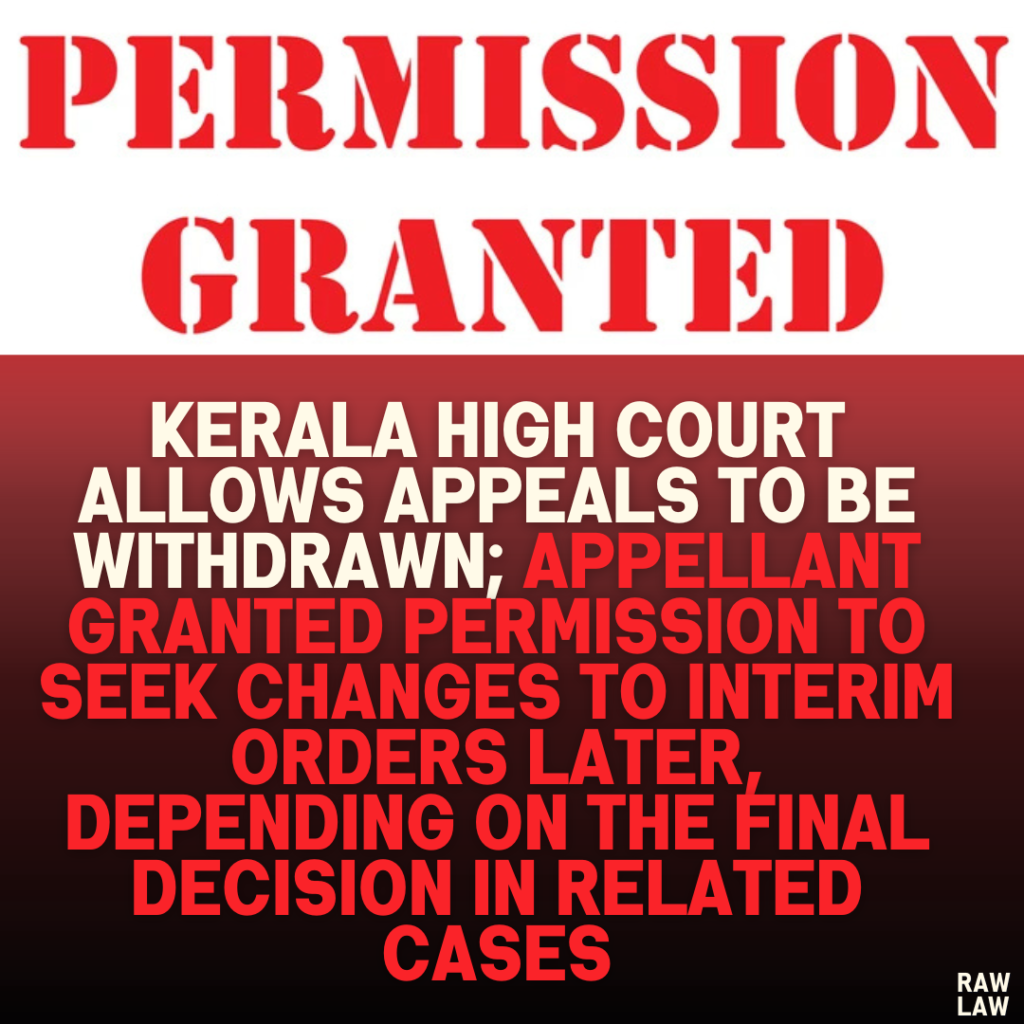Court’s Decision:
The Kerala High Court dismissed the writ appeals filed by Kannur Medical College and other appellants as withdrawn. Importantly, the dismissal was “without prejudice,” meaning the appellants retain the right to approach the learned Single Judge to modify the interim orders under challenge. The court emphasized that any such modification would depend on the final judgment rendered in Writ Appeal No. 129/2024 and related cases.
Facts:
- Parties Involved:
- The appellant, Kannur Medical College, challenged interim orders issued by the Single Judge in several writ petitions concerning administrative and regulatory issues.
- The respondents included the State of Kerala, the National Medical Commission, and affiliated medical colleges and institutions.
- Nature of Appeals:
- The writ appeals primarily sought relief against interim orders that were either regulatory or administrative in nature.
- The appellant moved to withdraw the appeals but wanted to retain the option to challenge the interim orders later.
- Procedure Followed:
- The appeals were heard together as they shared overlapping issues.
- The court permitted withdrawal but clarified that future challenges must align with the judgment in Writ Appeal No. 129/2024.
Issues Identified:
- Can the writ appeals be withdrawn without affecting the appellant’s right to seek modification of the interim orders later?
- What is the scope of the appellant’s right to challenge the interim orders in light of the final judgment in Writ Appeal No. 129/2024?
Petitioner’s Arguments:
- Withdrawal of Appeals:
- The appellant requested the court to allow the withdrawal of appeals without concluding the matter on merits.
- It argued that this procedural step was necessary to preserve its right to address concerns before the Single Judge at a later stage.
- Modification of Interim Orders:
- The appellant sought assurance that withdrawal would not bar it from seeking modifications to the interim orders after the final decision in related cases.
Respondent’s Arguments:
- Acceptance of Withdrawal:
- The respondents did not oppose the withdrawal of the appeals.
- They, however, maintained that the appellant must adhere to the principles set out in Writ Appeal No. 129/2024 when seeking modifications.
- Consistency in Judicial Orders:
- The respondents emphasized that interim orders should remain binding unless valid grounds for modification are established in line with the final judgment.
Analysis of the Law:
- Principle of Judicial Economy:
- The court aimed to prevent unnecessary judicial proceedings by allowing the appellant to withdraw the appeals without forfeiting its rights to challenge the orders later.
- This preserves court resources while maintaining fairness.
- Rights of Appellants:
- Withdrawal without prejudice ensures appellants can reapproach the court if subsequent developments warrant a review of the interim orders.
- Impact of Final Judgment in Writ Appeal No. 129/2024:
- The judgment in this related case will act as a guiding precedent for any modifications sought by the appellant.
- The court clarified that future proceedings must align with the conclusions drawn in the precedent case.
Precedent Analysis:
- Writ Appeal No. 129/2024:
- The final judgment in this case serves as the basis for future modifications.
- It establishes a procedural and substantive framework to address disputes concerning interim orders.
- General Judicial Precedents:
- The principle of withdrawal without prejudice is well established, ensuring litigants retain their substantive rights despite procedural withdrawals.
Court’s Reasoning:
- Withdrawal With Retention of Rights:
- The court permitted withdrawal to prevent redundancy in judicial proceedings, ensuring that the appellants could focus their efforts on substantive challenges before the Single Judge.
- Guidance from Precedent:
- Any future challenges to interim orders must be consistent with the principles laid out in the connected case, Writ Appeal No. 129/2024.
- Procedural Fairness:
- The court balanced the procedural need for finality with the substantive rights of the appellants to ensure fairness.
Conclusion:
- The writ appeals were dismissed as withdrawn.
- The dismissal was without prejudice, enabling the appellant to seek modifications to the interim orders from the Single Judge.
- Future modifications are subject to compliance with the final judgment in Writ Appeal No. 129/2024.
Implications:
- Procedural Efficiency:
- The court avoided multiple parallel proceedings by directing the appellant to pursue its grievances before the Single Judge.
- Guidance for Future Cases:
- The decision reinforces the importance of adhering to final judgments in connected cases when addressing subsequent challenges.
- Preservation of Substantive Rights:
- The judgment highlights the court’s effort to ensure appellants are not procedurally disadvantaged while preserving judicial consistency.




Pingback: Supreme Court Enhances Compensation for Minor Motor Accident Victim, Citing Lifelong Dependency and Disability: "Compensation Must Be Liberal, Not Niggardly" - Raw Law